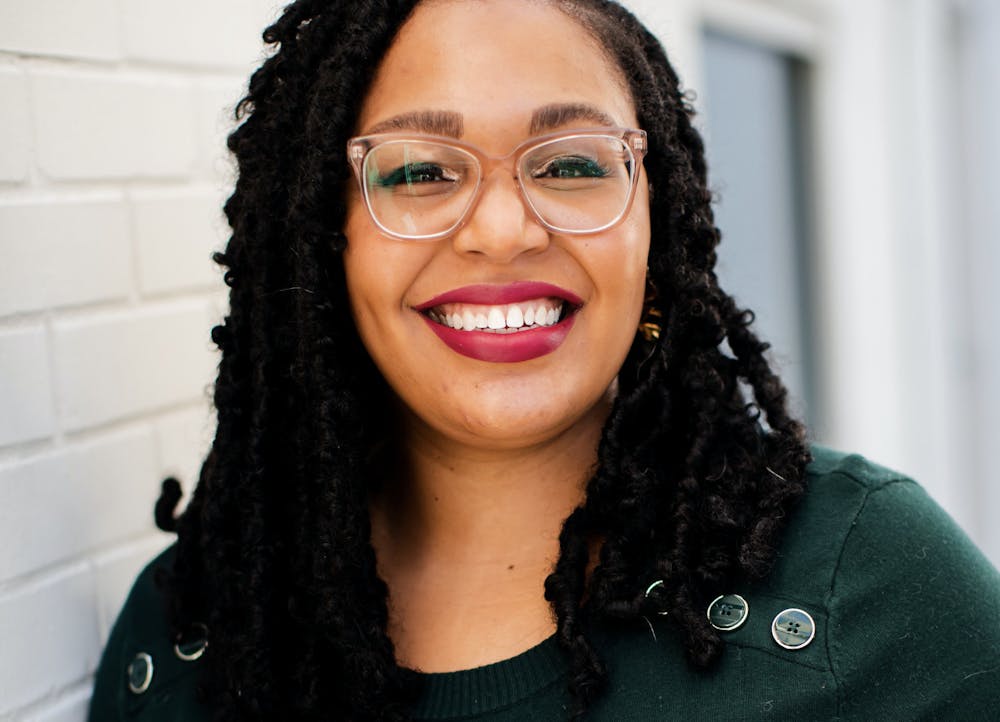Editor's note: This article is part of a series of mayoral and city council candidate profiles. Check back for more throughout the week.
Durham City Council Ward I candidate Marion Johnson, Sanford ‘14, envisions a future in which an equity-centered Durham exists for every citizen.
“The platform is really just about justice … accessibility justice and economic justice, housing justice … making sure that we as a city are centering equity in all aspects of what we do, making sure that we are as accessible, affordable and livable for everyone in Durham, as opposed to just a small group of people in Durham,” Johnson said.
Goals for Durham
There are six types of justice outlined on Johnson’s platform: accessibility justice, economic justice, environmental justice, housing justice, safety & justice and social justice. One of the tenants under social justice is committing the City Council to being explicitly anti-racist, instead of just non-racist.
Johnson said that she hopes to make city government as accessible as possible and geared towards amplifying marginalized voices, making sure that people close to harm feel like city government is for them as opposed to removed from them and simply dictating their day-to-day life. She said that residents should see the city government as a resource and support system.
In addition to equity, Johnson is passionate about budgeting and how to change Durham economically. She wants to advocate to the state for more progressive tax policies in order to fund the areas that attract people to both Durham and North Carolina.
“The reason that businesses move to different places and people move to different cities is because of the quality of life, the public education system, the infrastructure,” Johnson said. “We need a fundamental restructuring of our tax system in order to actually fund the things that would help people the most.”
In order to make Durham more accessible, affordable and livable, Johnson prioritizes affordable housing and environmental justice. This involves trying to ameliorate the climate crisis at the city level and addressing the fact that COVID-19 has made Durham’s economic crisis more serious, she said.
Johnson wants to involve participatory budgeting, which centers on community outreach and being responsive to community feedback on where the city’s money should be spent. She said she wants to reach more communities to make people feel engaged and allow them to determine what happens in their own neighborhood, especially the neighborhoods that have been vulnerable to gentrification and displacement in the past.
“Participatory budgeting is something that is very near and dear to my heart as somebody who loves to nerd out about the budgeting process in general, and as somebody who really feels like residents should have as much ownership over the political process as possible,” Johnson said.
Leaving and returning home
Johnson grew up in Charlotte, N.C. and was raised by Nigerian immigrant parents. She said she wants to focus on how to support the people who have been the most harmed historically, especially those in the past year and a half of the pandemic. In her career thus far, she has worked to help these communities, starting when she was in school.
After graduating from college, she moved to Washington, D.C. with her then-girlfriend, now wife, and was one of the few people in her graduating class to find a job during the recession.
Johnson was torn about staying in D.C.—she could either study part-time at George Washington or Georgetown University or full-time in North Carolina.
During the week when she was deciding if she wanted to stay in D.C. or get another degree, North Carolina Amendment 1 passed, which prohibited same-sex marriage in the state.
“I really felt compelled to come back to North Carolina and be part of pushing us back in a progressive direction,” Johnson said. “All of my friends who are still in North Carolina were like, ‘this is going on the ballot,’ and I said ‘oh, no, it's not going to pass, they're just trying to get it out of their system.’ And that was not the case.”
Johnson moved to Durham in 2012 and graduated from her master in public policy from the Sanford School of Public Policy in 2014. She went back to working for nonprofits, beginning with policy research and analysis, but after moving to the North Carolina Justice Center, she shifted her work to community engagement and empowering people through active participation in determining the budget process.
Johnson later joined Frontline Solutions, a Black-owned social justice consulting firm that works with nonprofits and foundations to center equity in every aspect of their work, and has been there for almost four years now.
In terms of political experience, Johnson started working on city council campaigns a couple of years after she moved to Durham and was on the board of Durham People’s Alliance for three years. She worked on the city council campaigns of Vernetta Alston in 2017 and Julian Johnson in 2019, and always knew that she wanted to run for office herself, she said.
Get The Chronicle straight to your inbox
Sign up for our weekly newsletter. Cancel at any time.
Everything changed in 2020, which was supposed to be the year Johnson set aside to not do any political work and make the transition from helping with campaigns to being the candidate. However, she said that she didn’t get the relaxing year she was hoping for.
“I was part of a Marie Claire article that was about women who watched Donald Trump get elected and were like, ‘well shoot … If this guy can run for office, I should definitely be running for office,’” Johnson said.
Johnson said that the year ended up being very clarifying for her in terms of her priorities and what she felt needed to happen for Durham, which is why she is now campaigning.
Alison Korn is a Pratt senior and enterprise advisor of The Chronicle's 119th volume.

